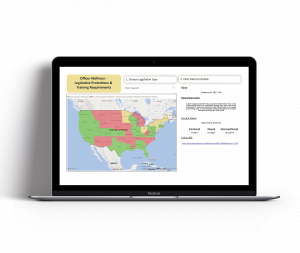 Over the past several years, the importance of officer wellness has come to the forefront with more agencies implementing wellness programs, embedding wellness into their agency culture, and investing resources into their most important asset: their people.
Over the past several years, the importance of officer wellness has come to the forefront with more agencies implementing wellness programs, embedding wellness into their agency culture, and investing resources into their most important asset: their people.
As a result of prioritizing officer mental health, and a subsequent increase in wellness programming, states are starting to implement more and more legislation related to officer wellness.
In today’s environment, where officer wellness efforts continue to expand and evolve, understanding and incorporating legislation and training mandates is critical. Finding state-specific legislation related to officer wellness can be challenging due to several factors, including
-
- Frequency of changes: Some states hold annual legislative sessions, while others convene every other year, resulting in legislation changing at different times.
- Nuances of each state: Each state has its own formalities and processes regarding legislation and implementation.
- Webpages being outdated and disorganized: Most states have their own legislation page, but the websites are often difficult to navigate or infrequently updated.
- Complexity of legal system and language: Legislation includes complex legal language that can be challenging to comprehend without extensive legal knowledge. Additionally, the format can be difficult to follow.
In response to feedback describing the challenges of finding and understanding what legislative elements exist, the IACP created the Officer Wellness Dashboard to help ensure that agencies are aware of wellness-related legislation within their state. Insight from the field indicated that the two most challenging topics involved peer support communication protections and benefits that may exist for post-traumatic stress (or other mental health conditions) resulting from working as a policing professional.
The purpose of this valuable resource is to simplify the challenging aspects of finding specific legislation and its status. The dashboard serves as a starting point for policing professionals to easily access legislation regarding officer wellness in their state. It currently highlights the following topics:
Peer Support Confidentiality Protections: Peer support serves as a powerful resource for police in addressing stress management, mental health concerns, suicide prevention, and overall officer wellness. Formalized peer support programs should be properly structured, ensuring that ethical and confidential services are offered. To ensure that this is being done appropriately, understanding the legal protections in place surrounding peer support is crucial.
Mental Health and Post-Traumatic Stress Disorder (PTSD) in Workers’ Compensation: Post-traumatic stress disorder (PTSD) is a mental health condition resulting from witnessing a severe or traumatic event. Due to the nature of the job, police are more likely to develop PTSD than the general population.1 If events that occur during an officer’s duties result in a PTSD diagnosis, they may be eligible for workers’ compensation.
Training Mandates: Some states have started mandating training related to officer wellness, mental health, and resilience. This training is key to building a culture of wellness and should be implemented alongside other required training, such as firearms and emergency vehicle operations.
The IACP Officer Wellness Dashboard provides an easy-to-use database designed specifically for policing professionals to find officer wellness–related legislation and training mandates. It includes easily digestible descriptions and links to specific pieces of legislation or related websites. Through the use of this database, policing professionals will reduce the amount of time spent sifting through legislation to see if it applies to their agency.
The dashboard is designed using Microsoft Power BI technology and features a user-friendly, interactive, color-coded map. The user simply selects which legislation or training topic and the state, and the map populates that information. The page will be updated regularly to ensure all legislation is current and additional topics will be added as new legislation is passed. Additionally, within the next year, the IACP will add another important topic—mandated mental wellness checks.
The Officer Wellness Dashboard is a product of the National Consortium on Preventing Law Enforcement Suicide (the Consortium), convened by the IACP in partnership with the Education Development Center and the National Action Alliance for Suicide Prevention. The Consortium is funded and supported through the U.S. Department of Justice’s Bureau of Justice Assistance as part of their VALOR Initiative. The Consortium is a group of multidisciplinary experts who work together to prevent law enforcement suicide. The Consortium focuses on creating solutions to new and upcoming challenges within the profession to better address officer mental health and prevent law enforcement suicide.d
Note:
1First Responders: Behavioral Health Concerns, Emergency Response, and Trauma, Disaster Technical Assistance Center Supplemental Research Bulletin (SAMHSA, May 2018).
Please cite as:
Megan Amaturo and Katelyn Bailey, “Officer Wellness Dashboard,” IACP@Work, Police Chief 91, no. 7 (July 2024): 64–65.


